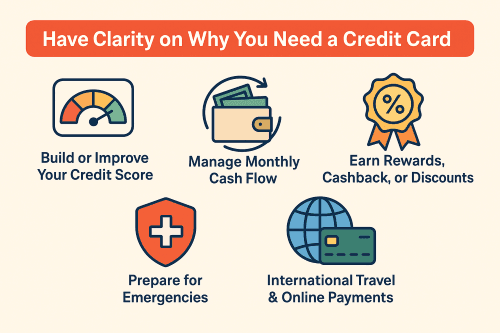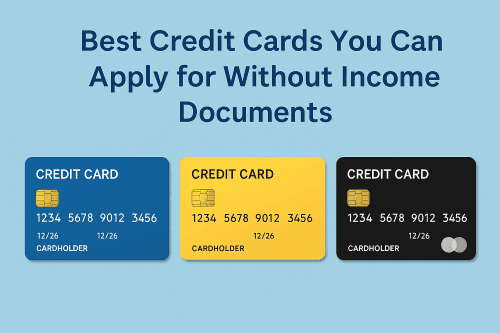Last Updated on September 14, 2025 3:41:19 AM by Vivek Makwana
Learn how to apply for a credit card in India without providing proof of income. Discover smart options such as protected cards and student cards, as well as practical advice for quick acceptance.
Introduction
Obtaining a credit card without income verification may appear tough, but it is not impossible. Whether you’re a student, a homemaker, or a freelancer who doesn’t receive regular paychecks, there are sensible methods to get credit. In this beginner’s guide, we’ll show you how to apply for a credit card without evidence of income, as well as your options and advice for increasing your chances of approval.
Why is income proof usually required?
Most banks ask for earnings archives like salary slips, IT returns, or Form 16 to investigate your compensation capacity. However, notevery body earns in a usual way. Thankfully, numerous banks now offersavings cardsbesides strict income documentation, especially to these with true credithistory or constant deposits.
Who Can Apply Without Income Proof?
You may be eligible if you belong to one of the following categories:
- Students have a valid college ID.Students with a valid college ID
- Homeowners with a high credit score or co-applicant
- Freelancers/self-employed with a good banking history.
- Individuals with a fixed deposit or savings balance
Start Paraphrasing
🧠 Have Clarity on Why You Need a Credit Card
Getting a credit score card is easy—but the use of it the right way begins with understanding why you want one. Without a clear purpose, a credit score card can lead to impulsive spending and debt traps. Before applying, ask yourself: What do I want to reap with this card?

🎯 1. To Build or Improve Your Credit Score
If you are just beginning your monetary journey, a credit score card is a wonderful tool to set up credit score history. By making small purchases and paying your payments on time, you can build a fantastic deposit score in 3–6 months. This helps you:
- Get authorized for loans easily
- Qualify for higher hobby rates
- Secure greater deposit limits in the future
Best choice: Secured deposit playing cards or scholar deposit cards
💡 2 To Manage Monthly Cash Flow
Credit playing cards assist you easy out your month-to-month spending. You can purchase essentials like groceries, fuel, or utilities—even if your paycheck hasn’t arrived yet—and pay later, ideally in full.
Benefits:
- Up to 45-50 days of interest-free creditUp to 45–50 days of interest-free credit
- Track and categorize your expenses.
- Avoid carrying large amounts of cash.
🏆 3. To Earn Rewards, Cashback, or Discounts
If you spend wisely, you can earn rewards on your purchases. Many cards offer cashback on fuel, dining, travel, or online shopping.
Examples:
- 5% cashback on groceries
- Free flight miles or lounge access
- Discounts on OTT subscriptions
Pro Tip: Don’t overspend just to earn rewards—they don’t justify interest charges on unpaid bills.
🛡️ 4. To Prepare for Emergencies
Unexpected events like a medical expense or travel delay can strain your finances. Having a credit card gives you a financial cushion.
Ideal for:
- Students living away from home.Students living away from home
- Freelancers or gig workers with inconsistent income
- Households without emergency funds
🌏 5. For International Travel & Online Payments
Credit cards are required for overseas travel, hotel reservations, and shopping on worldwide websites such as Amazon US and Airbnb. Many travel cards offer:
- Complimentary insurance
- Airport lounge access
- Forex mark-up waivers
❌ When NOT to Get a Credit Card
Avoid applying for a credit card if your primary goal is to:
- Spend money you do not have.Spend money you don’t have
- Pay off other loans or debts.
- Show off a lifestyle that you cannot afford.
- Take cash advances frequently (high interest rates!).
Best Ways to Get a Credit Card Without Income Proof
1. Secured Credit Cards (Against Fixed Deposits)
These are the simplest to obtain. Simply open a fixed deposit (typically Rs10,000 or more), and the bank will issue a credit card with an 80-90% limit on your FD.
Top Options:
- SBI Advantage Plus Card
- ICICI Bank Coral Credit Card (against FD)
- Axis Bank Insta Easy Credit Card
2. Add-On Credit Cards
If a family member already owns a credit card, they can apply for an add-on card for you. The secondary user does not need to provide proof of income.
3. Pre-Approved Credit Cards
Banks may provide pre-approved cards to customers who have a good savings or transaction history. Check with your bank’s app or online banking interface.
4. Student Credit Cards
Some banks provide student credit cards to college students. These are often low-limit cards that require no income verification.
Best Student Credit Cards in India
1. SBI Student Plus Advantage Card
- Issued against FD for students.Issued against FD for students
- Earn 1 reward point for every Rs 100 spent.
- Waive the fuel surcharge.
- No annual fee if yearly spend is Rs35,000 or more.
2. ICICI Bank Student Forex Prepaid Card
- Great for students studying abroad
- Can be loaded with multiple currencies
- Comes with travel insurance
3. HDFC ISIC Student ForexPlus Card
- combines Forex convenience with student identity.Combines student identity with Forex convenience
- Accepted in more than 130 nations
- Proof of income is not necessary.
4. Axis Bank Insta Easy Credit Card
- Secured card issued against FD
- Low documentation
- Credit limit up to 80% of FD value
Documents Needed
- Aadhaar card
- PAN card
- College ID or admission letter or Bank Statment
- Passport-size photo
Tips to Improve Approval Chances
- Maintain a healthy savings account balance
- Open an FD with a reputed bank
- Use your existing debit card actively
- Keep a good credit score (above 700)
📝 How to Build a Credit Score from Scratch
Introduction
If you’ve never taken out a loan or used a credit card, your credit score most likely does not yet exist. But don’t worry—building a credit score from scratch is simple if you take the appropriate measures. A good credit score can help you receive loans, credit cards, and even better job opportunities in some industries!
Why It Matters
- Determines your eligibility for loans and credit cards
- Affects interest rates offered to you
- Helps landlords, banks, and employers assess your reliability
How to Start Building Your Credit Score
Get a secured credit card.
Apply for a credit card with a fixed deposit. Use it frequently and pay your payments on schedule.
2. Become an Add-On Cardholder
Ask a family member to add you as a secondary user on their credit card.
3. Pay your bills and EMIs on time.
Paying your phone bill or an education loan on time is really important.
4. Avoid applying for too many loans.
A high volume of questions in a short period of time will affect your score.
5. Maintain a healthy credit utilization ratio.
Try to spend less than 30% of your credit limit.
How Long Does It Take?
It usually takes 3 to 6 months of regular credit card usage to generate your first credit score.
Final Thoughts
Applying for a credit card without income evidence is very achievable, especially in today’s digital banking world. Whether you’re just starting out or don’t have a steady income, choices like secured and student cards make it simple to start developing your credit.
Frequently Asked Questions (FAQs)
Q1: Can someone without a job obtain a credit card?
You can, indeed. Secured credit cards and add-on cards are examples of options that don’t require employment or income.
Q2: For a secured credit card, how much FD is needed?
A minimum FD of Rs 10,000 to Rs 20,000 is required by most banks.
Q3: Will my credit score rise as a result?
Yes, you can gradually raise your credit score by using your credit responsibly and making your payments on time..
How can I obtain a credit card if I don’t have proof of income?



2 comments
Good information
Can you be more specific about the content of your article? After reading it, I still have some doubts. Hope you can help me.